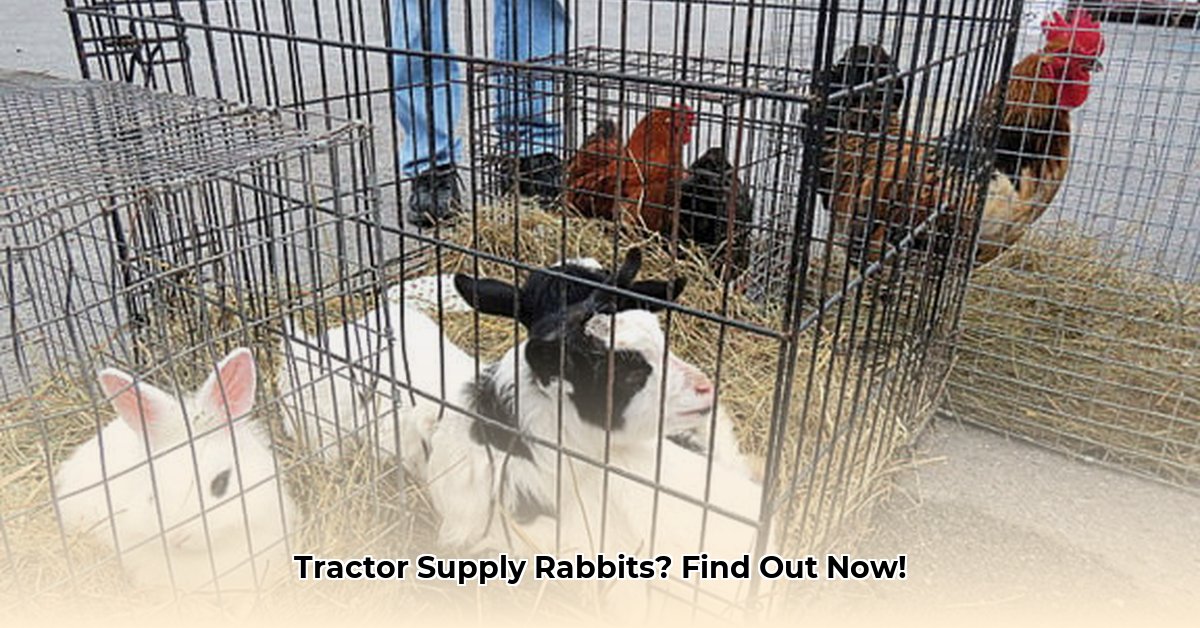
Why You Won't Find Rabbits at Tractor Supply
You're looking for rabbits, and you might have considered Tractor Supply. The simple answer is no; they don't currently sell live rabbits. This decision stems from a commitment to responsible pet ownership. The risk of impulse purchases leading to neglected animals is significant. However, this doesn't mean your dream of raising rabbits is impossible. It opens a door to a much more rewarding and potentially lucrative path: building your own sustainable rabbit farm. For more information on Tractor Supply's rabbit policy, see this page.
Sustainable Rabbit Farming: A Growing Market
Forget big box stores—a powerful movement towards sustainable agriculture is gaining momentum, and raising rabbits is a perfect fit. It’s a niche market, meaning less competition and more opportunities for success. You're not simply raising bunnies; you're contributing to a more ethical and environmentally responsible food system while building a potentially thriving small business. It's a chance to connect with nature, be your own boss, and enjoy the satisfaction of producing your own food sustainably. Is this opportunity intriguing?
Three Pivotal Points for Success:
- Market Demand: Demand for ethically-sourced, high-quality protein sources like rabbit meat is increasing.
- Efficient Production: Rabbits reproduce quickly and efficiently, requiring less space and feed compared to other livestock.
- Growing Interest: There's a rising interest in sustainable and small-scale farming, making rabbit farming an attractive option.
Building Your Ethical Rabbit Farm: A Step-by-Step Guide
Ready to transform your interest in rabbits into a successful venture? Let's build your farm, step-by-step:
1. Planning and Preparation:
1.1 Breed Selection: Research breeds suitable for your goals (meat, fur, pets). Consider climate, temperament, and productivity. Popular meat breeds include Californian, New Zealand White, and Flemish Giant. (Consult breed-specific resources for detailed information).
1.2 Housing Design: Create safe, comfortable hutches with proper ventilation, protection from elements & predators and easy cleaning. Consider cage systems for larger operations, ensuring sufficient space per rabbit. (Consult online resources and veterinary guides for hutch design specifications).
1.3 Nutritional Needs: Develop a balanced diet consisting of high-quality feed, hay, fresh water, and occasional healthy treats. Avoid toxic foods. (Consult your veterinarian or rabbit-specific nutritional guides).
1.4 Health Management: Establish a preventative health plan including vaccinations, parasite control, and regular veterinary check-ups. Implement biosecurity measures to minimize disease risk. (Partner with a veterinarian experienced in rabbit care).
2. Establishing Your Rabbitry Business:
2.1 Business Plan Development: Create a detailed plan encompassing start-up costs, projected income, marketing strategies (e.g., direct sales, farmers' markets, online sales), and financial projections. Market research is crucial.
2.2 Location Selection: Secure a location complying with local zoning regulations, providing access to utilities and transportation. Consider climate and space requirements.
2.3 Legal Compliance: Acquire necessary permits and licenses for operating a rabbit farm in your area. Regulations vary by locality.
2.4 Marketing and Sales: Develop a strategic marketing plan. Explore options like direct sales, farmers' markets, selling to local restaurants or butchers, or online sales platforms. Highlight your ethical and sustainable farming practices.
3. Risk Mitigation Strategies:
This table outlines key risks and proven mitigation strategies:
| Risk Factor | Likelihood | Impact | Mitigation Strategies |
|---|---|---|---|
| Disease Outbreaks | High | High | Proactive vaccination; stringent hygiene; rapid veterinary attention; quarantine. |
| Market Fluctuations | Medium | Medium | Diversified products; strong customer relationships; value-added products (e.g., manure compost). |
| Competition | Medium | Medium | Differentiation through quality/ethics; niche markets; building a strong brand identity. |
4. Ethical Rabbit Farming Practices:
Ethical considerations are paramount. If raising rabbits for meat, humane slaughter and processing methods are essential. Transparency builds consumer trust and showcases your dedication to ethical farming.
Resources and Further Support
Numerous resources are available. Connect with online communities, agricultural extension services, and breed-specific clubs for support. Building relationships with local farmers and veterinarians provides invaluable networks.
Conclusion: Embracing the Opportunity
Tractor Supply's absence of live rabbits presents an incredible opportunity. Sustainable rabbit farming combines personal fulfillment with the potential for a profitable business. With careful planning, a dedication to ethical practices, and the utilization of available resources, you can build a successful and rewarding enterprise. Are you ready to embrace this challenge and embark on your rabbit farming journey?